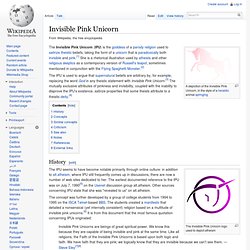

Are Humans Turning Into Gods? Invisible Pink Unicorn. The Invisible Pink Unicorn (IPU) is the goddess of a parody religion used to satirize theistic beliefs, taking the form of a unicorn that is paradoxically both invisible and pink.[1] She is a rhetorical illustration used by atheists and other religious skeptics as a contemporary version of Russell's teapot, sometimes mentioned in conjunction with the Flying Spaghetti Monster.[2] The IPU is used to argue that supernatural beliefs are arbitrary by, for example, replacing the word God in any theistic statement with Invisible Pink Unicorn.[3] The mutually exclusive attributes of pinkness and invisibility, coupled with the inability to disprove the IPU's existence, satirize properties that some theists attribute to a theistic deity.[4] History[edit] The Invisible Pink Unicorn logo used to depict atheism The concept was further developed by a group of college students from 1994 to 1995 on the ISCA Telnet-based BBS.

Invisible Pink Unicorns are beings of great spiritual power. Concepts[edit] Suicide_note. Top 10 Schools of Philosophy. Miscellaneous Through history, various forms of philosophy have developed.

Many have fallen by the wayside but a number have stuck. This is a list of the top 10 schools of philosophy. 10. Solipsism Nothing exists; Even if something exists, nothing can be known about it; Even if something could be known about it, knowledge about it can’t be communicated to others. - Gorgias (485-375 BC) The Online Learning Blog from Study2U. Supposedly browsing the internet requires more brain power than watching television.

Although judging from some of the websites we’ve come across that assumption is cast into doubt. Here’s some of the sites we like that might get your brain to sit up and listen. Ted A conference that started in 1984 bringing together experts in technology, entertainment and design quickly grew into so much more. The conference itself is invitation only, but the website features all the talks at the conference in high res video format. New Scientist. List of unsolved problems in philosophy. This is a list of some of the major unsolved problems in philosophy.

Clearly, unsolved philosophical problems exist in the lay sense (e.g. "What is the meaning of life? ", "Where did we come from? ", "What is reality? ", etc.). Aesthetics[edit] Essentialism[edit] In art, essentialism is the idea that each medium has its own particular strengths and weaknesses, contingent on its mode of communication. Art objects[edit] This problem originally arose from the practice rather than theory of art. While it is easy to dismiss these assertions, further investigation[who?]
Western Philosophy. 15 Styles of Distorted Thinking. Free Online Course Materials. 25 Awesome Virtual Learning Experiences Online - Virtual Education Websites. Just because you’re online doesn’t mean that you can’t experience the world first-hand — or as close to first-hand as possible.

Here are websites that feature virtual learning experiences, exposing online visitors to everything from history to geography, astronomy to anatomy, literature to government. 7 Wonders Panoramas – 360-degree views of the Seven Wonders of the World. Arounder Virtual Tour of the Moon – 360-degree panoramic views of the moon, courtesy of the Apollo 11, 12 and 17 missions. (Many other Earth locations also available on arounder.com.) Frissiras Museum – A virtual art gallery from Athens, Greece that allows you to explore paintings by clicking through their entire collection. Google Earth – Explore the geography of both land and sea (free download).
Howard Hughes Medical Institute’s Vital Signs: Understanding Cardiovascular Diseases – A virtual gallery teaching about heart disease. Louvre Virtual Tour – Virtual tour of the world-famous Louvre museum in Paris. Mount St. The Socratic Method. The Socratic Method:Teaching by Asking Instead of by Tellingby Rick Garlikov The following is a transcript of a teaching experiment, using the Socratic method, with a regular third grade class in a suburban elementary school.

I present my perspective and views on the session, and on the Socratic method as a teaching tool, following the transcript. The class was conducted on a Friday afternoon beginning at 1:30, late in May, with about two weeks left in the school year. This time was purposely chosen as one of the most difficult times to entice and hold these children's concentration about a somewhat complex intellectual matter. The point was to demonstrate the power of the Socratic method for both teaching and also for getting students involved and excited about the material being taught.
The experiment was to see whether I could teach these students binary arithmetic (arithmetic using only two numbers, 0 and 1) only by asking them questions. 1) "How many is this? " 4) Another way? Philosophy since the Enlightenment, by Roger Jones.